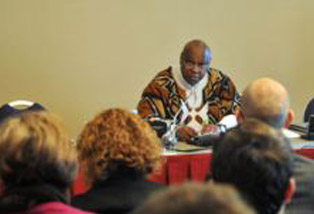Lela Kunchulia, Radio “Freedom”
Unequal access to state resources, politically motivated persecutions and restricted rights of citizens to elect accountable leaders – this is short list of current problems in Georgia which the UN Special Rapporteur on the Rights to Freedom of Peaceful Assembly and of Association reflected in his report; the report was published on June 20.
UN Special Rapporteur Maina Kiai made his first critical assessments in February 2012, when he published an interim report soon after his one-week visit to Georgia.
On February 13, at the end of his visit to Georgia, Maina Kiai prepared an interim report about human rights situation in Georgia; the government’s opponents found his report too strict and direct.
After his meeting with the representatives of the government of Georgia, civic society and political parties, and with Public Defender of Georgia UN Special Rapporteur concluded that amendments introduced to the Law of Georgia about Political Unions of Citizens in December of 2011 “created unequal political environment” and those amendments were designed “to control political activities” of one particular person (Bidzina Ivanishvili) rather than for objective purposes. Maia Kiai’s this and some other acute assessments resulted into debates at the February 14 session in the parliament of Georgia. Davit Darchiashvili from the majority tried to calm down opponents alleging that Maina Kiai’s negative assessments were result of “a set of alarming” information he received during his visit and that he would prepare final conclusions after having studied all issues carefully, which will make his report more impartial.
“I would like to assure you that those conclusions will be close to the real situation in the country and this reality is democracy; freedom of your speech proves it,” Davit Darchiashvili told opponents.
However, UN Special Rapporteur’s final report released in June is as strict as his interim one. Maina Kiai’s report, dedicated to the UN Human Rights Council, still seriously criticizes Law of Georgia about Assembly and Manifestation alongside several other issues; he again expressed his concerns with regard to the Law about Political Union of Citizens and indicated to the government’s desire to control political activities of Bidzina Ivanishvili.
According to the UN Special Rapporteur’s report, Law on Political Unions of Citizens could be used as an excuse to target persons in Georgia for political reasons through the Chamber of Control. It also states that the role of the ruling party is mixed up with the role of the government that leads to unequal usage of administrative resources.
The report reads that, “The Special Rapporteur is very concerned at the lack of a conducive environment in Georgia allowing political parties to operate as equals.” And it also clarifies that “Stark differences with regard to resource allocation were observed in law and in practice, leading the mandate holder to conclude that the right to freedom of association for political parties is being consistently violated. Unless remedial action is taken, citizens in Georgia will not be able to effectively elect leaders to represent their interests and to hold them accountable.”
Program Director at the Transparency International-Georgia Nina Khatiskatsi believes various issues reflected in the report of the UN Special Rapporteur are urgently important in the view of upcoming parliamentary and presidential elections.
“It was huge support for us [Georgian civil society]. The report proves we are not the only people who speak about these issues and we are not alone to observe those violations…It is obvious that organizations, who are not involved in the internal policy and do not work inside the country, make same evaluations as we do. I think joint effort of local media, civil society in general and international community will minimize current problems eventually,” Nina Khatiskatsi told Radio “Freedom.”
Program Director at the TI-Georgia reminds that after Maina Kiai’s visit to Georgia, local civil campaign This Affects You managed to eradicate the most evident shortcomings in the Law about Political Union of Citizens. However, NGOs and media organizations, representing or supporting the Campaign, believe several other acute problems both on the level of legislation and practice, still remain in the pre-election environment.




